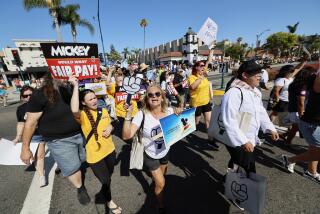Players Stand By Aug. 12 : Baseball: Anger over owners’ failed pension payment won’t lead to earlier strike date.
- Share via
Although angered by club owners’ refusal to make a $7.8-million pension payment from All-Star game receipts, major league player representatives agreed with the recommendation of their union leaders Thursday to retain their strike deadline of Aug. 12.
“Just because the owners have behaved in a highly irresponsible and provocative manner, perhaps intentionally, doesn’t mean the players have to,” Don Fehr, the union’s executive director, said after a conference call with player representatives.
“There was considerable sentiment for an earlier (strike) date, perhaps as soon as tomorrow, but the goal is to negotiate a new (bargaining) agreement, and we still feel that Aug. 12 best maximizes that possibility.”
At the same time, Fehr said, he “doesn’t want anybody to think the issue (of the pension payment) will go away or be compromised. There will not be an agreement without the payment and interest on it. We will continue to pursue legal remedies and make a choice (from among the options) within a few days.”
The players insist that they would not have played the All-Star game if they had known the owners were going to withhold the payment due on Aug. 1.
Richard Ravitch, the owners’ chief negotiator, said again Thursday that there was no obligation to make that payment because the pension provisions in the bargaining agreement expired on March 19. “I understand the players may be sorry we didn’t make a payment we weren’t obligated to make,” Ravitch said, seeming to shrug off the depth of the players’ anger.
“I’m pleased this tempest in a teapot has passed and we’re back to the bargaining table to talk about the real issues.”
Attorneys for the two sides met in work groups Thursday afternoon and will meet again this morning. There has been virtually no negotiation on the main issue of salary cap vs. status quo, but union counsel Lauren Rich said she wouldn’t dismiss the significance of the work groups. As long as there is dialogue, she said, there is hope.
The player representatives had to be convinced of that. Fehr said that about 10 teams had taken straw polls and favored an earlier date.
He said the feeling was, “Why are the owners doing this, what are they trying to accomplish, unless it’s to force a strike as soon as possible? What (the owners) did flies in the face of any desire management might express about reaching an agreement. But we’ve learned a hard lesson through the years and it still resonates. We have to make our own decisions and do what we have to do when we feel it’s appropriate. A strike is a last resort. We’re not going to exercise that option until we have no other choice.”
Fehr contends that a strike is the union’s only leverage. He fears that the owners will ultimately declare an impasse and unilaterally implement a salary-cap system. He said Thursday that it appears unlikely baseball can avoid its eighth work stoppage in 22 years.
Fehr’s pessimism didn’t prevent the union from proposing a plan by which the clubs would increase their revenue sharing to aid the small markets without tying it to a salary cap. Sources said the plan is based on sharing all broadcast revenue--local as well as national--but it is expected to be rejected by big-market clubs, which agreed to Ravitch’s increased formula only if it was tied to a cap by which the players, as the union contends, pays them back.
Fehr indicated that he would release details of his proposal after it has been fully presented to the owners, probably today.
More to Read
Go beyond the scoreboard
Get the latest on L.A.'s teams in the daily Sports Report newsletter.
You may occasionally receive promotional content from the Los Angeles Times.










